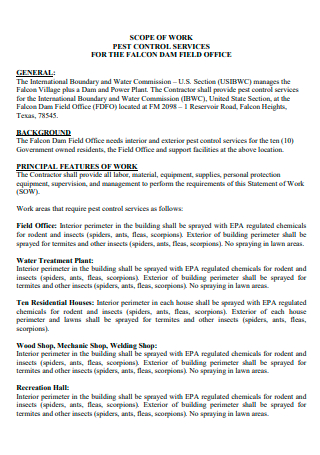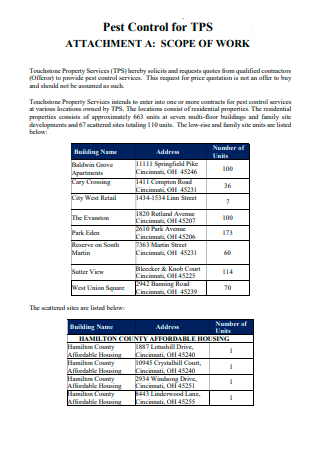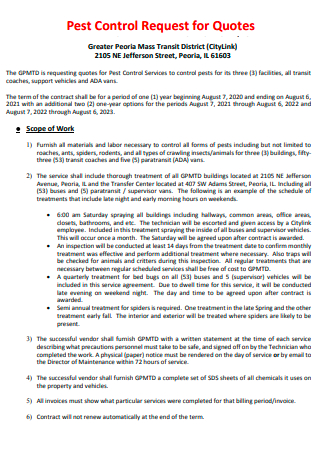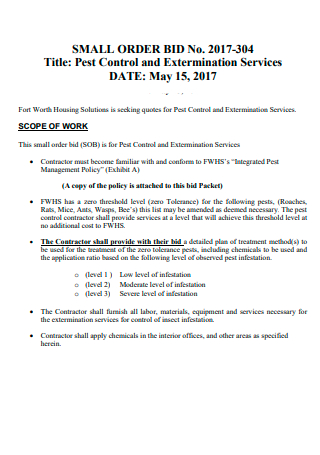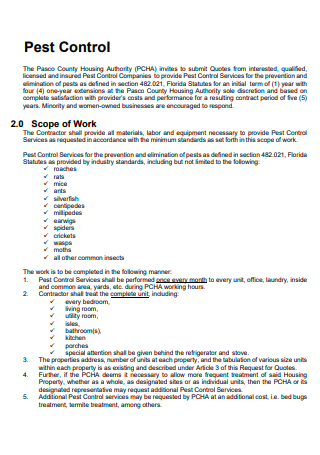4+ Sample Pest Control Scope of Work
FREE Pest Control Scope of Work s to Download
4+ Sample Pest Control Scope of Work
What Is a Pest Control?
What are The Types of Pest Control?
What Are the Critical Areas for Pest Infestations?
When Should Pest Control Be Done?
How Do You Dispose of the Hazardous Wastes?
How to Prepare For Pest Control
What to Do After Pest Control
FAQs
Why hire a professional and not do it yourself?
How long after the first treatment will it take to see results?
What is the difference between a treatment using baits versus sprays?
Is pest management safe for my family and pets?
What Is a Pest Control?
Pest Control or Pest Management refers to the regulation of species that usually causes damage to the health and daily lives of people. It is a known method of eliminating all types of creatures defined as pests such as flies, mosquitoes, ants, spiders, cockroaches, termites, wasps, bees, bedbugs, plants, rats, snakes, and many more which mostly go from place to place where food or humans occupy. Pest control is composed of a team of people who will work with you to assess the level and type of infestation and then set out a plan to eradicate the pests from your home.
According to the Food and Agriculture of the United Nations, over 40% of the food crops worldwide are lost every year due to infestation of pests and plant diseases.
Moreover, the rise of the global Pest Control Industry has a compound annual growth rate of 4.5% from 2020 and is expected until 2027.
What are The Types of Pest Control?
There are several services provided depending on the corresponding state or how it can be categorized into–there is the availability of Chemical, Biological, Hygienic, Fumigation, Physical, Heat Treatment, and Fogging. Some of the following are what are usually offered:
What Are the Critical Areas for Pest Infestations?
Pests are everywhere but the most critical areas for infestation are Pharmacies, Research Facilities, Intensive Care Units, Respiratory Care Areas, Supply and Processing, and Sterilization, and Food Industries. There should be a list of pesticides for intended use in the critical areas. The planned use of pesticides in these areas requires recognition of the attendant of hazards to occupants, equipment, supplies, and surfaces. No substitution can be done without approval from the Environmental Protection Agency.
When Should Pest Control Be Done?
Pest control should be done by setting a schedule in order for it to be performed without being interrupted. It can be done depending on what was agreed upon but it is advisable to perform in springtime because the pest colonies and pest numbers are low. The treatment has a lesser work to do, making it more effective and long-lasting. Most of the time, one treatment is enough.
How Do You Dispose of the Hazardous Wastes?
You should deal with hazardous waste disposal on a regular basis. One of the proper waste disposal and management can be done by applying the 3R which are mainly Reduce, Reuse, and Recycle. While reducing means lessening the amount of trash or garbage produced, reusing refers to using materials more than once, and recycling means creating new materials or products out of trash or garbage.
Step 1: Classify Your Waste to See If it is Hazardous or Dangerous
Detail the content of any waste products or materials used before sending it to recycling or disposal. The description must include: the waste classification code, whether it’s hazardous, the types of premises or business where the waste was produced, the name of the substance or substances, the process the produced the waste, a chemical and physical analysis, any special problems, requirements, or knowledge related to the waste
Step 2: Separate and Store Hazardous Wastes Safely
You must store waste safely and securely as follows: store the waste in a secure place, use suitable containers that will help stop waste escaping, label containers clearly with the kind of waste they contain, use covers to stop waste from blowing away, use waterproof covers if rain could cause contaminated run-off or prevent the waste from being reused.
Step 3: Use an Authorized Carrier to Collect, Recycle, Dispose of Your Hazardous Wastes
Make sure that the chosen waste carrier or registered and their waste sites have environmental permits.
Step 4: Fill in the Parts of the Consignment Notes that Apply to You
Use consignment notes to move hazardous waste and it must stay with hazardous waste until it reaches its destination.
Step 5: Make Sure to Track Your Wastes
Check if you or your people disposed of the wastes properly to keep the environment healthy and to make sure it does not affect the health of anyone.
How to Prepare For Pest Control
Preparing for pest control can be an extensive act by itself. Below are a few tips that you can utilize to help you.
What to Do After Pest Control
Once the pest control process is finished, you may want to consider a few actions. Either of the following is more than appropriate for your benefit and safety.
FAQs
Why hire a professional and not do it yourself?
The pests are sometimes misdiagnosed and this results to the treatments that are not done properly. Pest control professionals accurately identify the insect species and its source or hiding area. Through this observation done professionally, correct treatment recommendations will be made by using the most effective products and necessary steps. Moreover, doing the treatment by yourself is risky and may cause injury or health issues.
How long after the first treatment will it take to see results?
Results may vary depending on the pest infestation in your home or business, treatment methods used, and products used. The technician will outline what your expectations for your particular problem should be.
What is the difference between a treatment using baits versus sprays?
The bait treatments offer consumers peace of mind if they do not prefer liquid chemicals to be applied in their areas. While usage of sprays depends on the severity of the problem and other factors that determine the type of treatment to be implemented. Take not that most pest control professionals are very careful when it comes to removing unwanted guests in your areas. It is important to accept whatever they will recommend.
Is pest management safe for my family and pets?
To make sure the products or materials used are safe, these items should be tested and approved by the EPA. These should be checked by highly-trained and certified individuals. However, if the client decides to opt for a much safer and guaranteed effective products, there is the availability of baits, exclusion, and sanitation.
Controlling pests is such an exhausting task for most people and businesses. Pests affect your daily life without you knowing. In order to keep a clean environment, pest control provides protection from harmful insects, plants, or animals that may cause health issues and property damages. Generally, pest management is involved with the safety of our health, our foods and the protection of our property. It is vital to have a system of control for pests for the safety of the overall public.
The most important thing is to keep the cleanliness of your homes, business establishments, private and public industries. We need to prioritize our health by making sure our environment is clean and well-sanitized at all times.

